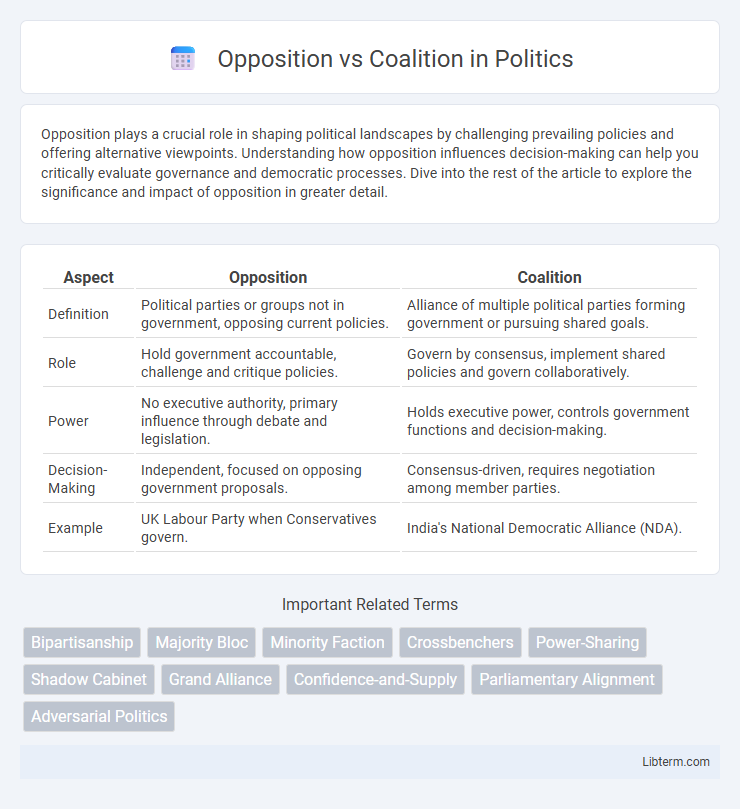Opposition plays a crucial role in shaping political landscapes by challenging prevailing policies and offering alternative viewpoints. Understanding how opposition influences decision-making can help you critically evaluate governance and democratic processes. Dive into the rest of the article to explore the significance and impact of opposition in greater detail.
Table of Comparison
| Aspect | Opposition | Coalition |
|---|---|---|
| Definition | Political parties or groups not in government, opposing current policies. | Alliance of multiple political parties forming government or pursuing shared goals. |
| Role | Hold government accountable, challenge and critique policies. | Govern by consensus, implement shared policies and govern collaboratively. |
| Power | No executive authority, primary influence through debate and legislation. | Holds executive power, controls government functions and decision-making. |
| Decision-Making | Independent, focused on opposing government proposals. | Consensus-driven, requires negotiation among member parties. |
| Example | UK Labour Party when Conservatives govern. | India's National Democratic Alliance (NDA). |
Understanding Opposition and Coalition in Politics
Opposition and coalition play critical roles in parliamentary politics, where opposition refers to parties or groups that challenge the ruling government, holding it accountable through debate and scrutiny. Coalitions consist of multiple parties that unite to form a government or strengthen their political influence, often requiring negotiation and compromise to maintain stability. Understanding the dynamics between opposition and coalition is essential for analyzing power distribution, policy-making processes, and democratic governance within political systems.
Key Differences Between Opposition and Coalition
Opposition refers to political parties or groups that do not hold power and actively challenge the policies of the ruling government, while a coalition is an alliance of multiple parties formed to govern collectively. The key difference lies in function: opposition scrutinizes and holds the government accountable, whereas a coalition collaborates to implement shared agendas and maintain a majority. Opposition seeks to offer alternative policies, whereas coalitions require negotiation and compromise among member parties to sustain governance.
The Role of Opposition in a Democratic System
The role of opposition in a democratic system is to hold the ruling government accountable by scrutinizing policies, proposing alternatives, and representing diverse public interests. Effective opposition ensures transparency and fosters healthy political debate, which strengthens democratic governance and protects against authoritarianism. By acting as a watchdog and a critical voice, opposition parties contribute to policy improvement and safeguard citizens' rights.
The Functions of a Political Coalition
Political coalitions play a crucial role in stabilizing governments by uniting diverse parties to achieve common policy goals and facilitate legislative decision-making. They enhance representation by bridging various interest groups, ensuring broader public support and political inclusiveness. Coalitions also function to strengthen governance efficiency, enabling coordinated action and compromise within multiparty systems.
Advantages and Disadvantages of Opposition
The opposition plays a crucial role in holding the government accountable by scrutinizing policies and offering alternative solutions, which strengthens democratic processes. However, opposition parties may face disadvantages such as limited access to resources and reduced influence in decision-making, often restricting their ability to implement changes. Their constant challenge to the ruling coalition can lead to political instability and hinder legislative progress.
Pros and Cons of Political Coalitions
Political coalitions enable diverse parties to combine resources and broaden voter appeal, increasing the likelihood of forming a government in parliamentary systems. However, they often face challenges in maintaining policy cohesion, leading to compromises that may dilute original party platforms and create voter dissatisfaction. The instability in coalition governments can result in frequent negotiations and potential breakdowns, impacting policy continuity and governance effectiveness.
Opposition vs Coalition: Impact on Governance
Opposition and coalition dynamics significantly influence governance by shaping legislative stability and policy outcomes. A strong opposition holds the governing coalition accountable, fostering transparency and preventing abuse of power. Coalition governments often lead to more inclusive decision-making but may face challenges in achieving consensus, impacting the efficiency of governance.
Case Studies of Opposition and Coalition Governments
Case studies of opposition and coalition governments reveal varying impacts on political stability and policy-making. In India, coalition governments like the United Progressive Alliance (UPA) have fostered inclusive governance but faced challenges in consensus-building among diverse parties. Conversely, opposition-led governments in countries like the United Kingdom have effectively held ruling parties accountable while sometimes struggling to implement alternative policies due to limited parliamentary power.
How Opposition and Coalition Shape Policy-Making
Opposition parties play a critical role in policy-making by holding the government accountable through rigorous debate, scrutinizing legislation, and presenting alternative policies. Coalitions influence policy outcomes by requiring compromise and negotiation among diverse political parties, often leading to more moderate and widely acceptable policies. The dynamic interaction between opposition critique and coalition consensus shapes the legislative agenda and government priorities in democratic systems.
Future Trends: Opposition and Coalition Dynamics
Future trends in opposition and coalition dynamics highlight increasing complexity due to shifting political landscapes and voter preferences. Emerging digital platforms enhance transparency and mobilize grassroots movements, altering traditional power balances between opposition parties and ruling coalitions. The rise of issue-based alliances and fragmented party systems will drive more fluid and tactical coalition formations, influencing governance stability and policy outcomes.
Opposition Infographic

 libterm.com
libterm.com